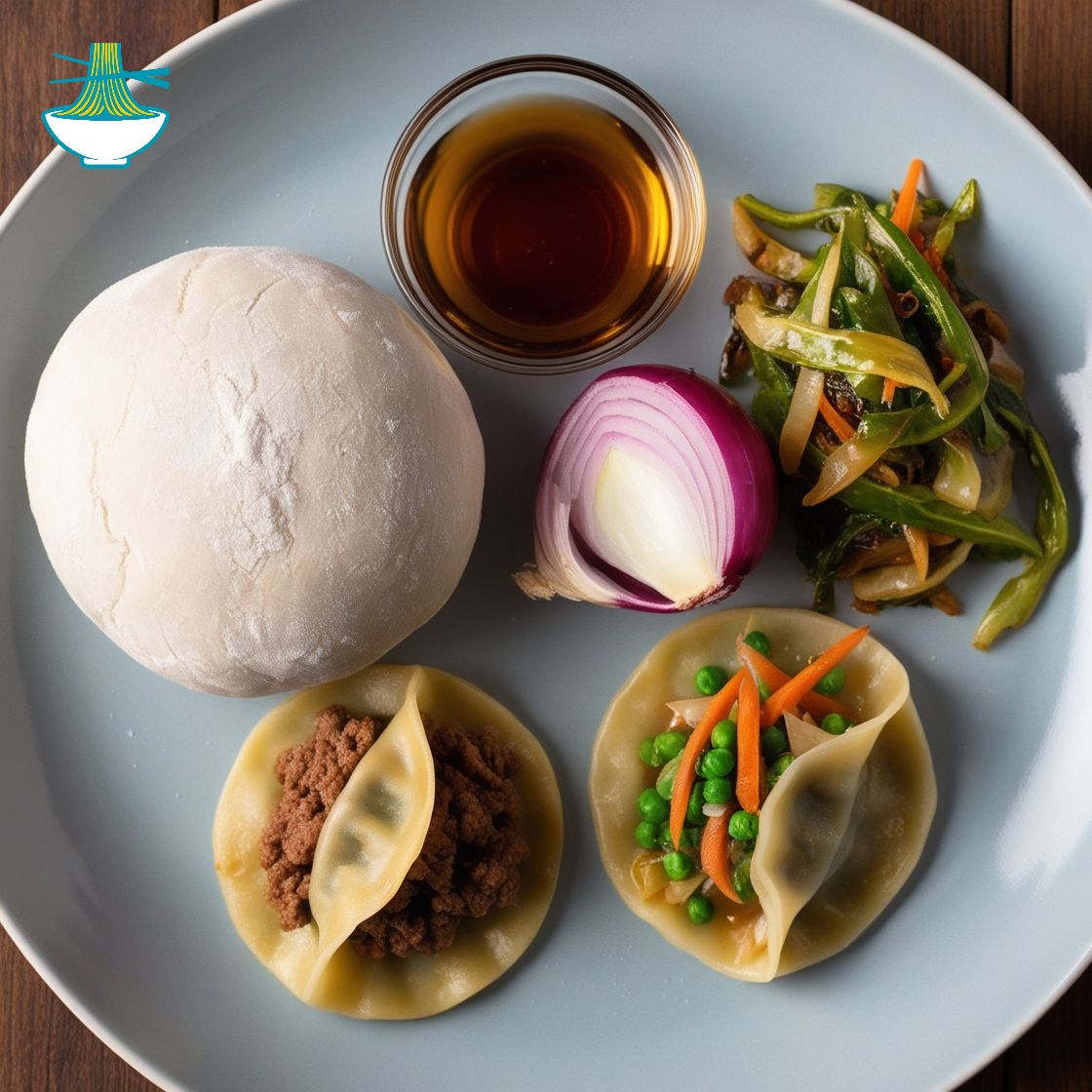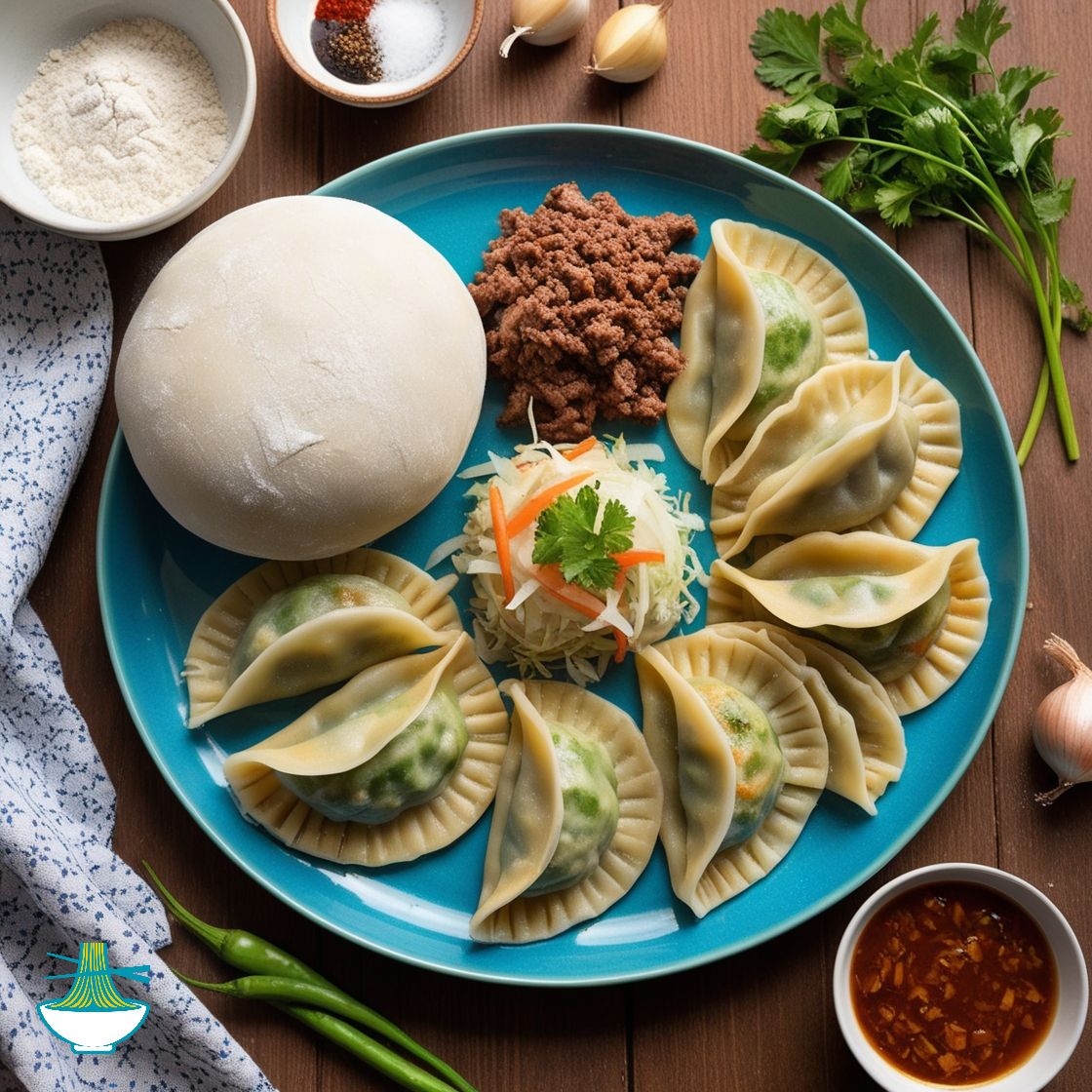Bhutanese Shabalay are delicious fried dumplings filled with either meat or vegetables, offering a crispy exterior and a savory filling. These golden parcels are perfect for a snack or a main dish, bringing a taste of Bhutanese culinary tradition into your kitchen. With a simple dough and a choice of flavorful fillings, Shabalay are easy to prepare and sure to delight.

Shabalay, also known as Shabhaley, is a traditional Bhutanese dish that reflects the country's rich culinary heritage. Originating in the Himalayan region, these dumplings have been a staple in Bhutanese cuisine for generations. Traditionally filled with minced meat and seasoned with local spices, Shabalay showcases the unique flavors and ingredients of Bhutan. Over time, vegetarian versions have also become popular, making Shabalay a versatile and beloved dish in Bhutanese households. These dumplings are often enjoyed during festivals, family gatherings, and as a comforting street food, symbolizing the warmth and hospitality of Bhutanese culture.

Ingredients:
For the Dough:
- 2 cups all-purpose flour
- 1/2 cup water (adjust as needed)
- A pinch of salt
For the Filling (Meat Option):
- 1 cup minced meat (beef, chicken, or pork)
- 1 onion, finely chopped
- 2 cloves garlic, minced
- 1 teaspoon ginger, grated
- 1 teaspoon soy sauce
- 1 teaspoon Bhutanese red chili powder (adjust to taste)
- Salt and pepper to taste
- Cooking oil for sautéing
For the Filling (Vegetarian Option):
- 1 cup finely chopped cabbage
- 1 cup finely chopped carrots
- 1/2 cup green peas
- 1 onion, finely chopped
- 2 cloves garlic, minced
- 1 teaspoon ginger, grated
- 1 teaspoon soy sauce
- 1 teaspoon Bhutanese red chili powder (adjust to taste)
- Salt and pepper to taste
- Cooking oil for sautéing
For Frying:
- Cooking oil

Instructions:
Prepare the Dough:
1. In a mixing bowl, combine the all-purpose flour, a pinch of salt, and gradually add water to form a smooth, elastic dough. Knead for about 5-7 minutes.
2. Cover the dough with a damp cloth and let it rest for at least 30 minutes.
Prepare the Filling:
1. For the meat filling: In a pan, heat oil and sauté onions, garlic, and ginger until aromatic. Add minced meat and cook until browned. Add soy sauce, Bhutanese red chili powder, salt, and pepper. Cook until well combined and set aside.
2. For the vegetarian filling: In a pan, heat oil and sauté onions, garlic, and ginger until aromatic. Add chopped vegetables and cook until they are tender yet still crisp. Add soy sauce, Bhutanese red chili powder, salt, and pepper. Stir well and set aside.
Assemble the Shabalay:
1. Divide the rested dough into small balls. Roll each ball into a thin disc, about 4-5 inches in diameter.
2. Place a spoonful of the prepared filling in the center of the disc. Fold the dough over the filling to create a half-moon shape and seal the edges by pressing with a fork.
Frying:
1. In a deep pan or wok, heat cooking oil over medium heat.
2. Carefully place the filled and sealed Shabalay into the hot oil. Fry until golden brown and crispy on both sides.
3. Remove and place on paper towels to absorb excess oil.
Serve:
Bhutanese Shabalay is best enjoyed hot and can be served with a side of dipping sauce or your favorite chutney. Indulge in the crispy exterior and flavorful filling of Bhutanese Shabalay, a delightful fusi

Nutritional Values:
For the Dough:
1. 2 cups all-purpose flour:
- Calories: 910
- Carbohydrates: 190 g
- Protein: 26 g
- Fat: 2 g
- Sodium: 2 mg
- Cholesterol: 0 mg
- Vitamins: B vitamins (thiamine, riboflavin, niacin)
- Minerals: Iron, magnesium, phosphorus
- Nutritional benefit: Provides energy from carbohydrates, contains some B vitamins and minerals like iron which are essential for oxygen transport in the body.
2. 1/2 cup water:
- Calories: 0
- Carbohydrates: 0 g
- Protein: 0 g
- Fat: 0 g
- Sodium: 0 mg
- Cholesterol: 0 mg
- Vitamins: None
- Minerals: None
- Nutritional benefit: Essential for hydration, supports all bodily functions including digestion and nutrient absorption.
3. A pinch of salt:
- Calories: 0
- Carbohydrates: 0 g
- Protein: 0 g
- Fat: 0 g
- Sodium: 390 mg (per pinch, approximately 1/8 teaspoon)
- Cholesterol: 0 mg
- Vitamins: None
- Minerals: Sodium, trace amounts of other minerals
- Nutritional benefit: Sodium is essential for maintaining fluid balance, nerve function, and muscle contractions, but should be used in moderation to avoid high blood pressure.
For the Filling (Meat Option):
1. 1 cup minced meat (beef, chicken, or pork)
- Calories: 250-300 (varies by type)
- Carbohydrates: 0 g
- Protein: 20-25 g
- Fat: 15-20 g
- Sodium: 60-70 mg
- Cholesterol: 70-80 mg
- Vitamins: B vitamins (B12, B6, niacin)
- Minerals: Iron, zinc, phosphorus
- Nutritional benefit: High in protein for muscle repair and growth, rich in iron for oxygen transport, and B vitamins for energy metabolism.
2. 1 onion, finely chopped
- Calories: 44
- Carbohydrates: 10 g
- Protein: 1 g
- Fat: 0 g
- Sodium: 4 mg
- Cholesterol: 0 mg
- Vitamins: Vitamin C, B6
- Minerals: Potassium, manganese
- Nutritional benefit: Good source of vitamin C for immune health, contains antioxidants that help reduce inflammation.
3. 2 cloves garlic, minced
- Calories: 9
- Carbohydrates: 2 g
- Protein: 0.4 g
- Fat: 0 g
- Sodium: 1 mg
- Cholesterol: 0 mg
- Vitamins: Vitamin C, B6
- Minerals: Manganese, selenium
- Nutritional benefit: Contains compounds with medicinal properties, supports immune function, and has anti-inflammatory effects.
4. 1 teaspoon ginger, grated
- Calories: 2
- Carbohydrates: 0.4 g
- Protein: 0 g
- Fat: 0 g
- Sodium: 0 mg
- Cholesterol: 0 mg
- Vitamins: Vitamin C
- Minerals: Magnesium, potassium
- Nutritional benefit: Aids digestion, has anti-inflammatory and antioxidant effects, and can help reduce nausea.
5. 1 teaspoon soy sauce
- Calories: 5
- Carbohydrates: 1 g
- Protein: 1 g
- Fat: 0 g
- Sodium: 900 mg
- Cholesterol: 0 mg
- Vitamins: None
- Minerals: Iron
- Nutritional benefit: Adds flavor, contains some iron, but should be used in moderation due to high sodium content.
6. 1 teaspoon Bhutanese red chili powder (adjust to taste)
- Calories: 6
- Carbohydrates: 1 g
- Protein: 0.3 g
- Fat: 0.3 g
- Sodium: 0 mg
- Cholesterol: 0 mg
- Vitamins: Vitamin A, C
- Minerals: Potassium, iron
- Nutritional benefit: Rich in vitamins A and C, which support vision and immune health, and contains capsaicin, which has anti-inflammatory properties.
7. Salt and pepper to taste
- Calories: 0
- Carbohydrates: 0 g
- Protein: 0 g
- Fat: 0 g
- Sodium: Varies by amount used
- Cholesterol: 0 mg
- Vitamins: None
- Minerals: Sodium (from salt)
- Nutritional benefit: Enhances flavor, sodium is essential for fluid balance and nerve function, but should be used in moderation.
8. Cooking oil for sautéing
- Calories: 120 (per tablespoon)
- Carbohydrates: 0 g
- Protein: 0 g
- Fat: 14 g
- Sodium: 0 mg
- Cholesterol: 0 mg
- Vitamins: None
- Minerals: None
- Nutritional benefit: Provides essential fatty acids and helps in the absorption of fat-soluble vitamins. Choose healthier oils like olive oil or canola oil for better nutritional benefits.
For the Filling (Vegetarian Option):
1. 1 cup finely chopped cabbage:
- Calories: 22
- Carbohydrates: 5 g
- Protein: 1 g
- Fat: 0 g
- Sodium: 17 mg
- Cholesterol: 0 mg
- Vitamins: Vitamin C, K
- Minerals: Folate, manganese
- Nutritional benefit: Low in calories, high in fiber and vitamin C, supports immune function and digestion.
2. 1 cup finely chopped carrots:
- Calories: 52
- Carbohydrates: 12 g
- Protein: 1 g
- Fat: 0 g
- Sodium: 88 mg
- Cholesterol: 0 mg
- Vitamins: Vitamin A, C, K
- Minerals: Potassium, fiber
- Nutritional benefit: Rich in beta-carotene, supports eye health, boosts immune function, and promotes healthy skin.
3. 1/2 cup green peas:
- Calories: 62
- Carbohydrates: 11 g
- Protein: 4 g
- Fat: 0 g
- Sodium: 4 mg
- Cholesterol: 0 mg
- Vitamins: Vitamin C, K, B1 (thiamine)
- Minerals: Iron, magnesium, potassium
- Nutritional benefit: Excellent source of plant-based protein, high in fiber, supports heart health and blood sugar regulation.
4. 1 onion, finely chopped:
- Calories: 44
- Carbohydrates: 10 g
- Protein: 1 g
- Fat: 0 g
- Sodium: 4 mg
- Cholesterol: 0 mg
- Vitamins: Vitamin C, B6
- Minerals: Potassium, manganese
- Nutritional benefit: Provides antioxidants, supports immune function, and adds flavor to dishes.
5. 2 cloves garlic, minced:
- Calories: 9
- Carbohydrates: 2 g
- Protein: 0.4 g
- Fat: 0 g
- Sodium: 1 mg
- Cholesterol: 0 mg
- Vitamins: Vitamin C, B6
- Minerals: Manganese, selenium
- Nutritional benefit: Contains sulfur compounds with health benefits, supports immune function, and has anti-inflammatory properties.
6. 1 teaspoon ginger, grated:
- Calories: 2
- Carbohydrates: 0.4 g
- Protein: 0 g
- Fat: 0 g
- Sodium: 0 mg
- Cholesterol: 0 mg
- Vitamins: Vitamin C
- Minerals: Magnesium, potassium
- Nutritional benefit: Supports digestion, has anti-inflammatory and antioxidant effects, and may help reduce nausea.
7. 1 teaspoon soy sauce:
- Calories: 5
- Carbohydrates: 1 g
- Protein: 1 g
- Fat: 0 g
- Sodium: 900 mg
- Cholesterol: 0 mg
- Vitamins: None
- Minerals: Iron
- Nutritional benefit: Adds flavor, contains some iron, but should be used in moderation due to high sodium content.
8. 1 teaspoon Bhutanese red chili powder (adjust to taste):
- Calories: 6
- Carbohydrates: 1 g
- Protein: 0.3 g
- Fat: 0.3 g
- Sodium: 0 mg
- Cholesterol: 0 mg
- Vitamins: Vitamin A, C
- Minerals: Potassium, iron
- Nutritional benefit: Rich in vitamins A and C, which support vision and immune health, and contains capsaicin, which has anti-inflammatory properties.
9. Salt and pepper to taste:
- Calories: 0
- Carbohydrates: 0 g
- Protein: 0 g
- Fat: 0 g
- Sodium: Varies by amount used
- Cholesterol: 0 mg
- Vitamins: None
- Minerals: Sodium (from salt)
- Nutritional benefit: Enhances flavor, sodium is essential for fluid balance and nerve function, but should be used in moderation.
10. Cooking oil for sautéing:
- Calories: 120 (per tablespoon)
- Carbohydrates: 0 g
- Protein: 0 g
- Fat: 14 g
- Sodium: 0 mg
- Cholesterol: 0 mg
- Vitamins: None
- Minerals: None
- Nutritional benefit: Provides essential fatty acids and helps in the absorption of fat-soluble vitamins. Choose healthier oils like olive oil or canola oil for better nutritional benefits.
For Frying:
Cooking oil (per tablespoon):
- Calories: 120
- Carbohydrates: 0 g
- Protein: 0 g
- Fat: 14 g
- Sodium: 0 mg
- Cholesterol: 0 mg
- Vitamins: None
- Minerals: None
- Nutritional benefit: Provides essential fatty acids and aids in the absorption of fat-soluble vitamins. Opt for healthier oils like olive oil or canola oil for better heart health.


Comments